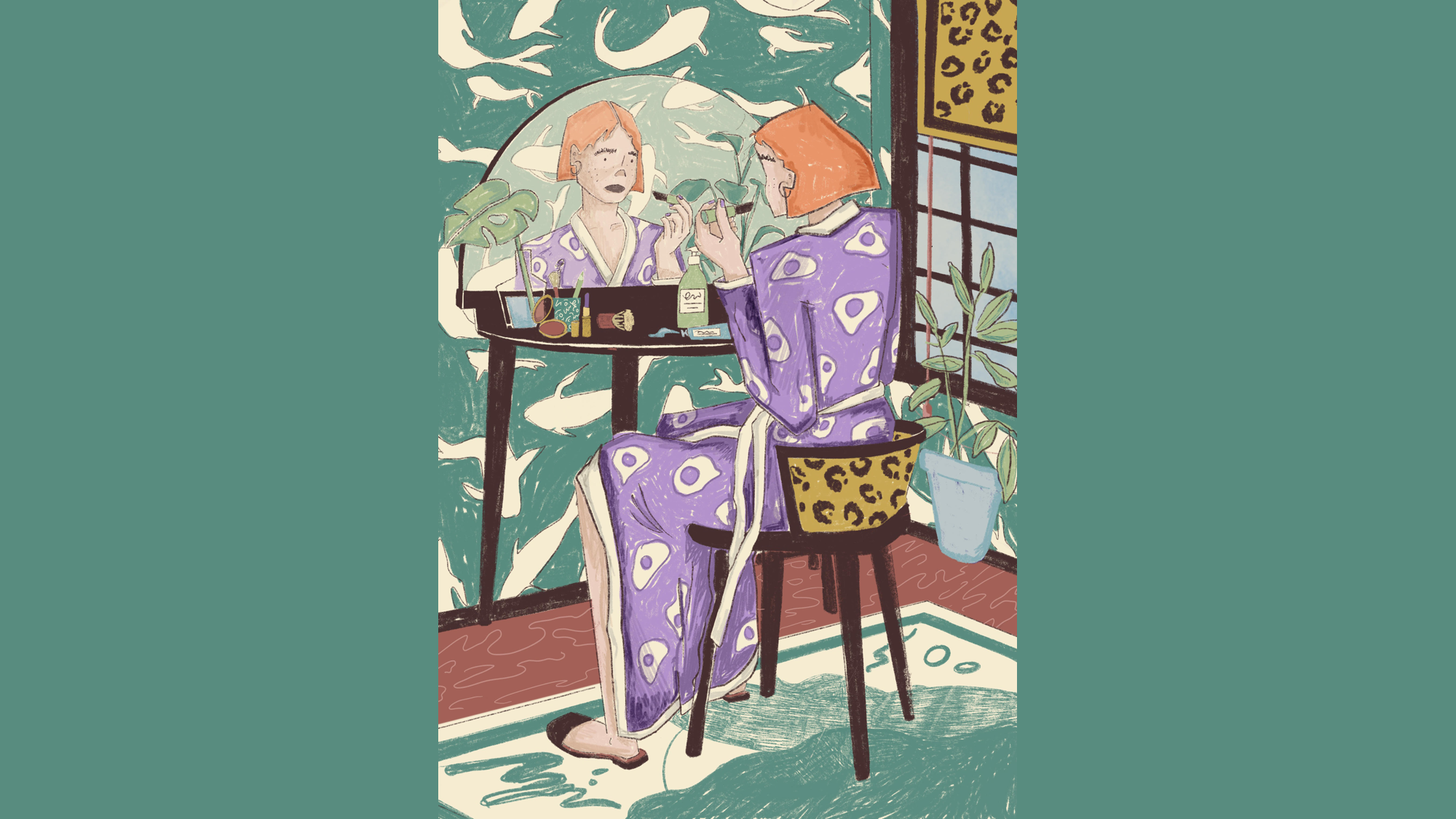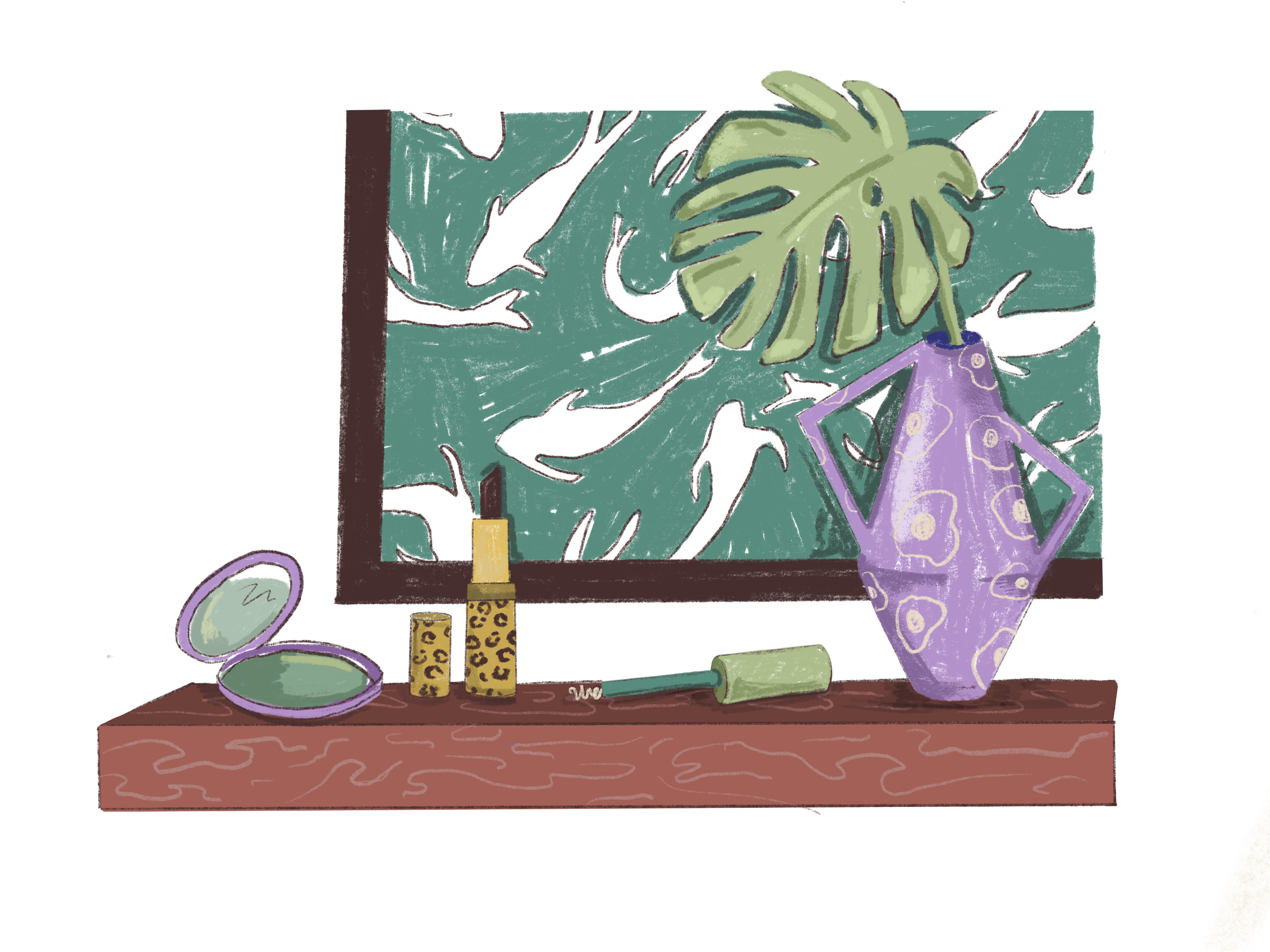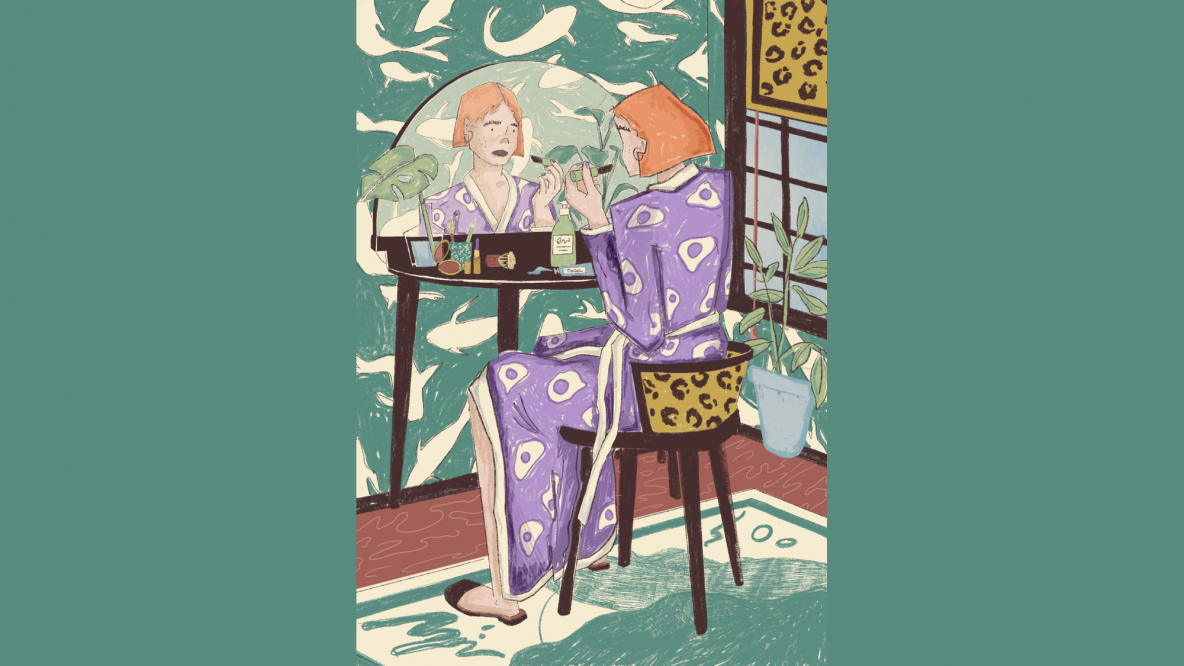PAINT YOUR BLANK CANVAS
Our resident beauty guru and style icon, Jess Moody, uncovers the power of makeup...
By Jess Moody

Illustration by Niamh Power
The sun is shining, its golden rays bouncing off the mirror. Observing your reflection, the face is a blank canvas.
An array of brushes and sponges litter the desk; a palette lies open from the previous day, revealing a rainbow of green, turquoise, fuchsia, violet and banana yellow. Icy white highlighter flecked with specs of silver sparkles in the morning light, juxtaposing the pot of jet black ink which you use to draw sleek lines across your eyelids. Select your tools. Buffer, blend, bake, experiment with light and shade, chisel cheekbones. This is YOUR workshop – unleash your creativity. Paint the blank canvas: you are transformed.
Makeup, as with any art form, is subjective. Just as there are no limits to sculpture, or portraiture, there is no set way to do your makeup. Yes, there are individual standards to judge whether one is wearing too much makeup; this is personal preference. However, this does not permit you to actively demean or prevent anyone from wearing makeup which you deem ‘too much’. Consider, for example, someone who prefers a ‘natural’ look, versus someone who prefers full coverage. The former wears mascara, brow gel and a clear balm, opting for earthy browns and nudes. The latter wears foundation, concealer, powder, bright pink shadow, liner, a red lipstick. Again, this is personal preference. It is probable that you are unaware of the reasons why someone chooses to wear makeup. Who are we to decide how other people present themselves? It could range from the desire to conceal under-eye bags, to accentuating their natural features, to feeling more confident, or expressing your gender identity. Regardless, makeup can be utilised as a form of self-expression, and a means to present the best version of you.
In 2017, a YouGov survey established that 63% of men believe women mostly wear makeup to trick people into thinking they are attractive.
This one-dimensional view merely reinforces the objectifying expectation that women must wear makeup in order to please the male gaze. Similarly, women who condemn other women for their choice to wear makeup, claiming that its purpose is to enhance an inferior view of women as mere sexual objects, are as equally regressive. Of course, makeup can be used to make us feel sexy and alluring, if this is your aim. Having said this, imagine spending that much time watching makeup tutorials and perfecting a smoky eye for this sole reason? What about people who enjoy the ritualistic process of applying it, or simply for the fun of it? These beliefs also ignore the crucial point that makeup is for ALL genders, not just women. Drag queens, for example, construct and transform their face with meticulous precision, utilising makeup to make a socio-political statement which frees them from the confines of heteronormative society and artificial gender boundaries. Wearing makeup is not a form of vanity, or a passive acceptance of gender norms. It is empowering; it is liberating.
Similarly, I don't think the transformative power of makeup in regards to your mood or self-presentation should not be dismissed as a form of ‘deception’. According to this logic, those who grow and style a beard as a means of hiding a ‘weak’ chin, or blemished skin are equally as deceiving. I am aware that makeup is seen as an 'unnatural' way of covering insecurities or enhancing features, as opposed to naturally grown hair. But aside from this, applying concealer or foundation to cover acne, dark circles or areas of skin which you feel self- conscious about is really no different in my eyes. Consider having to attend an interview for a managerial position, in front of a board of strangers. You slick your hair back in a high-ponytail - you don’t want to shy away behind a curtain of hair – but, your skin has decided now would be a brilliant time to break out. Here, makeup enables you to fulfil this desire, allowing you to stand tall and project yourself with confidence. Equally, if you are feeling down, the simple act of applying a fierce red lip or glittery shadow can instantly elevate your mood and exterior appearance.

Despite this, it is important to realise that in a selfie-saturated world – where Facetune, filters and photoshop are readily available – the power of makeup should be exercised with caution.
Makeup artists, models and celebrities on Instagram and in magazines are portrayed by the media as idealised images of perfection. This is damaging in light of how the media infiltrates every aspect of our lives. Every day, we walk past billboards and shop windows, advertising the latest foundations on models with skin so airbrushed to the point it looks entirely plastic. More damagingly, we have our phones readily available at any moment to compare ourselves to picture perfect influencers and celebrities. These images have created such warped perceptions of what it means to be ‘beautiful’ that for some, beauty is based solely on appearance. As Jameela Jamil rightly points out, there are now tens of millions of people “who struggle so much with their self image, due to decades of impossibly demanding body standards being inflicted upon us, and false imagery being used to subliminally manipulate
us into a feeling of (needless) disappointment in ourselves”. Such unrealistic standards, where the bar is set to achieving perfect skin, can be seriously damaging for our mental health. Let us remember the importance of beauty from within, reflected in our actions towards others, and try to remember that what you see on the screen is not always an authentic representation of
what can be achieved in reality.

To reiterate, there is no ‘proper’ way of applying, wearing or enjoying makeup, despite what the media dictates.
Makeup presents itself in unique ways to the artist, utilised according to individual desires and taste. A shift from seeing makeup as something which women need in order to be attractive, to a view of makeup as powerful and transformative, is liberating. Makeup has revolutionized the way we present ourselves, designating the body’s surface as a site for freedom of expression and identity. Above all else, the fact someone can be happy in their own skin, whether that extends to wearing makeup or not, comes above your opinion. Keep this in mind when judging exterior appearance; what you see outside does not reflect the person within.
Art by
Words by
Share this article

